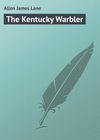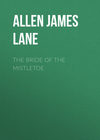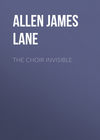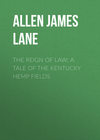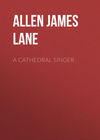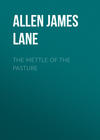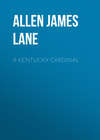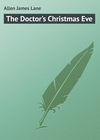Read the book: «The Kentucky Warbler», page 4
III
THE FOREST
It was the first day of vacation.
Schools, if you were not through with them, had now become empty, closed, silent buildings, stripped of authority to imprison and bedevil you and then mark you discreditably because you righteously rebelled against being imprisoned and bedeviled. They could safely be left to dust and cobwebs within and to any weeds that might lodge and sprout outside – the more the better. You stood on the spring edge of the long, free, careless summer and could look unconcernedly across at the distant autumn edge. Then as the woods, now in their first full green, were beginning to turn dry and yellow, the powerless buildings would again become tyrannical schools.
But if you had finished high school, on this first day of vacation you were on the Boy's Common: schools behind you, the world of business around you, ahead of you ambitious college or the stately University. Webster had been turned loose on the Boy's Common.
The family were at breakfast. Every breakfast in the cottage was much the same breakfast: routine is the peace of the roadless. Existence there throughout the year was three hundred and sixty-five times more or less like itself. The earth meantime did change for the signs of the zodiac: the cottage changed also, but had a zodiac of its own. Thus, when the planet was in the sign of Capricornus, the cottage on a morning had fried perch for breakfast, as a sign that it was in Pisces; when earth was in Gemini, the family might have a steak which showed that it was in Taurus– or that Taurus was in the family.
There was always hot meat of one kind and hot bread of two kinds and hot coffee of any kind. If Webster's father upon entering the breakfast room had not seen a dish before him to carve or apportion, the shock could not have been greater, had he found lying on his folded napkin an enclosure from the bank notifying him that he had been discharged for having made the figure four instead of the figure two.
He sat squarely facing the table as long as his own portion of the meat lasted, meantime eating rapidly and bending over to glance at his paper which lay flat beside his coffee cup. With the final morsel of meat he turned sidewise and sat cross-legged, with his paper held before his face as a screen – notification that he would rather not talk at the moment, unless they preferred… If they showed that they did prefer, he still had means to discourage their preference. Now and then he reached around toward his plate and groped for the remaining crumbs of bread, or hooked his forefinger in the handle of his cup and conveyed it behind the paper.
Webster's mother, busied with service at the tray, commenced her breakfast after the others. She talked to her husband until he interposed his newspaper. Then she unconsciously lowered her voice and addressed remarks to the children. Occasionally she tried to arrange their dissensions.
A satirist of human life, studying Webster's father and mother at the head and foot of the table – symbol at once of their opposition and conjunction – a satirist, who for his own amusement turns life into pictures of something else, might have described their bodily and pictorial relation as that of a large, soft deep-dished pudding to a well trimmed mutton chop. Their minds he would possibly have imagined as two south winds moving along, side by side; whatever else they blew against, they could not possibly blow against each other.
On this fine June morning, the first day of his vacation, Webster was late for breakfast. He arranged to be late. From his bathroom-bedroom he could hear the family with their usual morning talk, Elinor's shrill chatter predominating. When her chatter ceased he would know that she had satisfied her whimsical appetite and had slipped from her chair, impatient either to get to the front porch with its creaky rocking-chair or to dart out the gate to other little girls in the block; restlessly seeking some adventure elsewhere if none should pass before her eyes at home.
He waited till she should go; there was something especial to speak of with his father and he did not wish this to be spoiled by Elinor's interference and ridicule.
When she was gone he went in to breakfast.
"Well, my son, how are you going to spend your first day of vacation?" his father inquired, helping him to his portion and not particularly noticing his own question.
"I thought I'd go over into the woods," Webster replied.
An unfavourable silence followed this announcement. That old stubborn controversy about the woods!..
"Father," asked Webster, with his eyes on his plate, "did you ever see the Kentucky warbler?"
Webster's father looked over the top of the wood-pulp screen. His face had a somewhat vacant expression. He waited. Finally he said:
"My son, I believe you asked me a question: I shall have to ask you to repeat your question; I may be losing my hearing or I may be losing my mind. You asked me – ?"
Webster, in the same deliberate tone, repeated his question:
"Did you ever see the Kentucky warbler?"
Webster's father looked over his spectacles at Webster's mother as with the air of an appeal for guidance:
"My dear, your son asks me, if I understand him, whether I have ever seen a Kentucky wooden war horse?"
He was not above fun-making and it seemed to him that the occasion called for it.
Webster's mother explained:
"One of the professors from the University lectured to them in April about birds. His head has been full of birds ever since: I shouldn't wonder if his dreams have been full of them." She looked at Webster not without ineradicable tenderness and pride; she could not quite have explained the pride, she could have explained the tenderness.
Now the truth of the matter was that since that memorable morning of the April talk at high school, she had been hearing from Webster repeatedly on that subject. He had told her of the lecture immediately upon reaching home; she had never seen him so wrought up. And from that time he had upon occasion plied her with questions: as to what she knew of birds when she lived in the country. She had to tell him that she knew very little; everybody identified the several species that preyed upon fruit and berries and young chickens; she named these readily enough. She had never heard of a bird called the Kentucky warbler. And she had never heard of Alexander Wilson.
All this she had duly narrated to Webster's father – greatly to his dejection. A bank officer with a solitary son, now graduated from high school, going after bird-nests – that was a prospect before such a father! He had shaken his head in silence that more than spoke.
"I told him," Webster's mother had concluded, "that the only Wilsons worth knowing in Kentucky were the horse-people Wilsons: of course we know them. It has been amusing to watch Elinor. Whenever Webster has begun about birds, if she has overheard him, she has made it convenient to settle somewhere near and listen. She would break in and stop his questions, but then there would be no more entertainment for her. She has been a study."
Thus Webster's father was not so ill-informed as he now appeared. In return for the information from Webster's mother, apparently for the first time imparted, he looked at his son with an expression which plainly meant that as a speculation the latter was becoming a graver risk.
"No, my son," he said, "I have never met your forest friend. I am merely a Kentucky bank warbler. One who did his warbling years ago. There is some war left in me. I suppose there will always be war left in me, but there isn't any war-ble. I warbled one distant solitary spring to your mother. She replied beautifully in kind and lavishly in degree. We made a nest and had a hatching. Since then the male bird has been trying – not to escape the consequences of his song – but to meet his notes like a man. I have never stumbled upon your forest friend."
Webster ate in silence for a few moments and then remarked, as though it were a matter of vital importance:
"His notes are:
"'Tweedle tweedle tweedle, Tweedle tweedle tweedle,' Wilson described them that way a hundred and six years ago."
"I don't doubt it, my son. I am not questioning your word – nor Mr. Wilson's. But I don't see anything very remarkable in that: if you come to the bank any day, you can hear men say the same thing. They come in and say, 'Tweedle.' And they go out."
Webster continued:
"Audubon described the notes as 'Turdle turdle turdle.'"
Deeper silence at the table. Webster continued in the face of the silence;
"A living naturalist says the notes may be:
"'Toodle toodle toodle.'"
Silence at the table still more deep. Webster broke it:
"Another naturalist describes the bird as saying:
"'Ter-wheeter wheeter wheeter wheeter wheeter.'"
The silence! Webster continued:
"Another naturalist thinks the song is:
"'Che che che peery peery peery.'"
Webster's father raised his eyebrows – he had no hair to raise – at Webster's mother: a sign that their graduate was beginning to celebrate his vacation.
"My son," he said, "when I was a little fellow in school, one of the reading lessons was a poem called 'Try, Try Again.' Perhaps the bird is working along that line."
"Thomas Jefferson followed a bird for hours in the woods," said Webster, with dignity: he somehow felt rebuked. "And for twenty years he tried to catch sight of another."
"Don't let me come between you and Thomas Jefferson," said Webster's father, waving his hand toward his son in protest. "God forbid that I should come between any two such persons as Daniel Webster and Thomas Jefferson!"
"The government at Washington," observed Webster stoutly, "is behind the Kentucky warbler."
"Then, my son, I advise you to get behind the Government."
The rusty bell at the little front door went off with a sound like the whirr of a frightened prairie chicken. The breakfast maid, also the cook, also the maid of all work, also a unit of the standardised population of disservice and discontent, entered and pushed a bill at Webster's father.
"The butcher," she announced with sullen gratification, "He's waiting."
As Webster's father left the table, he tapped his son affectionately on the head with his paper: "You follow the bird, my boy; and follow Thomas Jefferson, if you can. The butcher follows me."
Webster's mother sat watching him. He had begun to get his lunch ready. He held the bottom-half of a long, slender roll, which might have served as a miniature model for an old-time Kentucky river-ark; and with his knife, grasped like an oar, he was lining the inside with some highly specialised yellow substance. She deplored his awkwardness and fought his independence.
"Let me put up your lunch for you, my son!"
"I'll put it up."
He was not to be cheated out of that fresh sensation of pleasure which comes to the male, young or old, who tries to cook in camp, to fry, to boil, to season, or to serve things edible.
Webster pulled out of his pocket a crumpled piece of brown paper and smoothed it out on the table cloth. It showed butcher stains.
Webster's mother protested.
"My son! Take a napkin! Take this clean napkin for your lunch!"
"I like this paper."
The idea of being in the forest and unrolling his lunch from a napkin: what would Wilson have thought? Elinor, being "nice," always rolled her lunch in a napkin.
"But you will be hungry: let me get you some preserves!"
"Not anything sweet." Elinor always had preserves. He rolled his lunch roughly and thrust it, butcher-stains and all, into his pocket. His mother was exasperated and distressed.
"My son, your lunch will come loose in your pocket: I'll get you a string."
"I don't want a string." Elinor tied everything. Girls tied; boys buttoned. The difference between men and women was strings.
"But you'll get the grease on you, Webster! It will run down your legs!"
"Very well, then, I'll have greasy legs. Why not?"
She followed him out to the porch. Her character lacked capacity of initiative. She waited for him to be old enough to take some initiative; then she would stand by him.
"Don't go too far," she said tenderly, "and you ought to have some of your friends to go with you, some of the boys from school."
"They can't go today. Nobody can go today. Anybody would be in the way today."
He said this to himself.
She watched him from the porch and called: "Don't stay too late."
Webster walked quickly to the main corner of the block – Jenny's corner. On this first morning of being through with school and of feeling more like a man free to do as he pleased, Jenny for that reason became more important – he must see her before starting. Heretofore the pleasure of being with Jenny had definitely depended upon what Jenny might do; this morning the idea was beginning to be Jenny herself.
She was in her trumpet-vine arbour, the roof of which was already sun-dried. The shaded sides were still dew-wet. She bounded across to him, very exquisite in her light blue frock with broad, fresh white ribbons in her light-brown hair: healthy, docile, joyous, with innocent blue eyes and the complexion of apple blossoms.
"Where are you going?" she asked in a voice which implied that the day would be as pleasant, no matter where he went: nevertheless she had no thought of appearing indifferent to him.
He told her.
"What are you going into the woods for?" she inquired, with little dancing movements of her feet on the yard grass in irrepressible health and joy and with no especial interest in his reply.
He told her.
"Could you go?" He very well knew she could not and merely yielded to an impulse to express himself: he was offering to ruin the day for her.
"They wouldn't let me," said Jenny, apparently not disappointed at being thus kept at home.
He sought to make the best of his disappointment.
"Even if you could go, I am afraid you never would be quiet, Jenny."
"I'm afraid I wouldn't," Jenny replied, responsive to every suggestion.
He lingered, tenderly disturbed by her: the roots of the future were growing in him this morning. He was changing, he was changing her: there was an outreaching of his nature to draw her into the future alongside him.
Jenny suddenly stopped dancing and came closer to the fence, having all at once become more conscious of Webster, standing there as he had never stood before, looking at her as he had never looked. Her nature was of yielding sweetness, clasping trust. She glanced around the cottage windows: the situation was very exposed. Webster glanced at the cottage windows: the situation did not appear in the least exposed. Her eyes became more round with an idea:
"Are you coming back this way?"
"I will come back this way."
Jenny danced away from the fence, laughing excitedly: "Will it be late?"
"I can make it late?"
Webster climbed the fence of the forest under the foliage of a big tree of some unknown kind and descended waist-deep into the foliage of a weed with a leaf as big as an elephant's ear: it had a beautiful trumpet-shaped white and purple flower. He wished he knew what it was: on the very edge of the forest, at his very first step, he had sunk waist-deep into ignorance. Then he waded through the rank nightshade and stepped out upon the grass of the woods – the green carpet of thick turf, Kentucky bluegrass.
At last he was there under those softly waving trees which summer after summer he had watched from the porch and windows: long they had called to him and now he had answered their call.
But the disappointment! As he had looked at the forest across the distance, the tree-tops had made an unbroken billowy line of green along the blue horizon, continuous like the waves of the sea as he imagined the sea. Somewhere under that forest roof he had taken it for granted that there would be thick undergrowth, wild spots for shy singing nesting birds. The disappointment! The trees stood ten or twenty or thirty feet apart. The longest boughs barely touched each other, their lowest sometimes hung forty or fifty feet in the air. He did not see a tree whose branches he could reach with his upstretched arm. The sun shone everywhere under them every bright day and the grass grew thick up to their trunks.
Another disappointment! The wood was small. He walked to the middle of it and from there could see to its edge on each of its four sides. On one side was a field of yellow grain – what the grain was he did not know – ignorance again. On the side opposite this was a field of green grain – what he did not know. Straight ahead of him as he looked through the trees, he could see an open paddock on which the sunlight fell in a blazing sheen; it turned to silver the white flanks of some calves and made soft gold of the coats of grazing thoroughbreds. Beyond the paddock he could see stables and sheds and beyond these a farmhouse: he could faintly hear the cackle of barnyard poultry.
He stood in bluegrass pasture – once Kentucky wilderness. It was like an exquisite natural park. As he had skirmished toward the country along turnpikes with school-mates or other friends during his life, often his eyes had been drawn toward these world-famous bluegrass pastures. Now he was in one; and it was here that he had come to look for the warbler which haunts the secret forest solitudes!
He sat down under a big tree with a feeling of how foolish he had been. This was again followed by an overwhelming sense of his ignorance.
He did not know the kind of tree he sat under nor of any other that stood far or near. These were such as sugar maple and red oak and white oak and black ash and white ash and black walnut and white walnut – rarely white walnut – and hickory and locust and elm and a few haws: he did recognise a locust tree but then a locust tree grew in Jenny's yard! All around him weeds and wild flowers and other grasses sprang up out of the bluegrass: he did not know them.
There was one tree he curiously looked around for, positive that he should not be blind to it if fortunate enough to set his eyes on one – the coffee tree. That is, he felt sure he'd recognise it if it yielded coffee ready to drink, of which never in his life had they given him enough. Not once throughout his long troubled experience as to being fed had he been allowed as much coffee as he craved. Once, when younger, he had heard some one say that the only tree in all the American forest that bore the name of Kentucky was the Kentucky coffee tree; and he had instantly conceived a desire to pay a visit in secret to that corner of the woods. To take his cup and a few lumps of sugar and sit under the boughs and catch the coffee as it dripped down… No one to hold him back … as much as he wanted at last …! The Kentucky coffee tree – his favourite in Nature!
He said to himself, looking all round him, that he had the outdoor loneliness and blindness of Silas Marner this wonderful morning.
Propped against the tree he sat still a while, thinking of the long day before him and of how he should spend it in this thin empty pasture, abandoned by the wild creatures. But as he deliberated, suddenly and then more and more he awoke to things going on around him.
A few feet away and on a level with his eyes a little fellow descended from high over-head. A little green gymnast trying to reach the ground by means of his own rope which he manufactured out of his body as he came down. How could he do it? How had he learned the very first time to make the rope strong enough to bear his weight instead of its giving way and letting him drop? Something seized one of Webster's ankles with a pair of small jaws like pincers and reminded him that his foot was in the way: it had better move on. A black ant suddenly rushed angrily over his knee. A cricket leaped in the grass. One autumn one of them had started its song behind the wainscoting, Elinor had pushed her toe against the woodwork and silenced it. A few feet away a bunch of white clover blossomed: a honey bee was searching it. Webster found on the back of one of his hands, which was pressed against the grass, a tiny crimson coach – a mere dot of a crimson coach being moved along he could not see how. The colour was most gorgeous and the material of the finest velvet. He let it go on its way across his hand withersoever it might be journeying. Directly opposite his eyes, some forty feet from the ground, was a round hole in a rotten tree-trunk. Webster wondered whether a bird ever pecked a square hole in anything. Suddenly from behind him a red-headed bird flew to the dead tree-trunk and alighted near the hole: he recognised the wood-pecker. And he remembered that this was the first bird Wilson had killed that first day he entered the American forest: he was glad that it was the first he encountered! No sooner had the wood-pecker alighted than the head of another bird appeared at the hole and the wood-pecker took to his heels – to his wings. Webster wished he had known what this other bird was: it had a black band across its chest and wore a speckled jacket and a dull reddish cap on the back of its head. A disturbance reached him from a nearby treetop, a wailing voice, a gulping sound, as if something up there were sick and full of suffering and were trying to take its medicine. He watched the spot and presently a crow flew out of the thick leaves: the crow's family seemed not in good health. A ground squirrel jumped to the end of a rotting log some yards away but at sight of him shrieked and darted in again. The whole pasture was alive.
Webster had all this time become conscious that another sound had been reaching his ear at regular intervals from the high branches of the trees, first in one place and then in another. His eyes had followed the voice but he could see no bird. The sound was like this:
Se – u – re?
That was the first half of the song – a question. A few moments later the other half followed, perhaps from another tree – the answer:
Se – u – u.
Here was a mystery: what was the bird? Could it be the bluebird! – his ignorance again, the comicality of his ignorance! Webster had never seen or heard a bluebird. He recalled what the professor had told them – that Alexander Wilson had written the first poem on the American bluebird, perhaps still the best poem; and he had given them the poem to memorise if they liked, saying that they might not think it good poetry, but at least it was the poetry of a man who thought he could criticise Robert Burns! Webster had memorised the verses and as he now searched the forest boughs for this invisible bluebird, he repeated to himself some of Wilson's lines:
"When all the gay scenes of summer are o'er
And autumn slow enters so silent and sallow
And millions of warblers that charmed us before
Have fled in the train of the sun-seeking swallow;
The bluebird, forsaken, but true to his home
Still lingers and looks for a milder tomorrow
Till forced by the horrors of winter to roam,
He sings his adieu in a lone note of sorrow."
Again that long fine strain cast far out upon the air like a silken reel:
Se – u – re? Se – u – u.
Or could it be a woodcock?
He got up by and bye and walked toward the field of yellow grain on one side of the pasture. Before he was halfway he stopped, arrested by a wonderful sound: from the top rail of the fence before him, separating the pasture from the grain, came a loud ringing whistle. It was Bobwhite! Boys at school sometimes whistled "bobwhite." He knew this bird because he had seen him hanging amid snow and ice and holly boughs outside meat shops about Christmas time. Here now was the summer song: in it the green of the woods, the gold of the grain, the far brave clearness of the June sky.
He tipped forward, not because his feet made any noise. Once again, nearer, that marvellous music rang past him, echoing on into the woods. Then it ceased; and as Webster approached the field fence what he saw was a rabbit watching him over the grass tops until with long soft leaps it escaped through the fence to the safety of the field.
